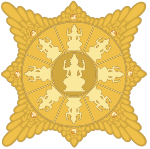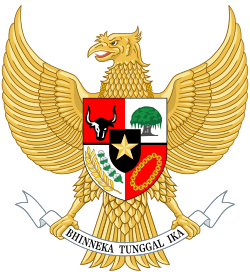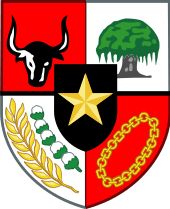Post-Suharto era in Indonesia
The Post-Suharto era in Indonesia began with the resignation of authoritarian president Suharto in 1998 during which the country has been in a period of transition. Known in Indonesia as the Reformasi (English: Reform[1][2]), this period is characterised by a more open and liberal political-social environment.
Issues over this period have included a push for a stronger democracy and civilian rule, elements of the military trying to retain their influence, a growing Islamism in politics and society, and demands for greater regional autonomy. The process of reformasi has resulted in a higher degree of freedom of speech, in contrast to the pervasive censorship under the New Order. This has led to a more open political debate in the news media and increased expression in the arts. Events that have shaped Indonesia in this period include a bombing campaign by Islamic terrorists (including the 2002 Bali bombings), and the 2004 Indian Ocean earthquake and tsunami.
Fall of Suharto
The Reformasi of 1998 led to changes in Indonesia's various governmental institutions, including the structures of the judiciary, legislature, and executive office. Generally, the fall of Suharto in 1998 is traced from events starting in 1996, when forces opposed to the New Order began to rally around Megawati Sukarnoputri, head of the PDI and daughter of the founding president Sukarno. When Suharto attempted to have Megawati removed as head of this party in a back-room deal, student activists loyal to Megawati occupied the headquarters of PDI in Jakarta. This culminated in Black Saturday on 27 July, when the military broke up the demonstrations.
These actions, along with increasing concerns over human rights violations in Indonesian-occupied East Timor, began to unsettle Suharto's usually friendly relations with Western countries such as Australia, the United Kingdom, and the United States. These further worsened when the 1997 Asian financial crisis hit Indonesia, highlighting the corruption of the New Order.
Economic instability from the crisis affected much of the country, in the form of increased prices for staple foods and goods, and lowered standards of living and quality of life. These touched off riots, many targeting ethnic Chinese Indonesians; bolstered by the findings of Parliamentary and independent investigations, it is often theorised that these anti-Chinese riots were instigated or aided by the military to divert anger away from Suharto himself.
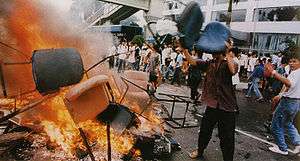
In West Kalimantan, there was communal violence between Dayaks and Madurese in 1996, in the Sambas riots in 1999 and the Sampit conflict 2001, resulting in large scale massacres of Madurese.[3][4][5] In the Sambas conflict, both Malays and Dayaks massacred Madurese.
Growing dissatisfaction with Suharto's authoritarian rule and the rapid erosion of the economy led many, chiefly the younger generation, to renew their protests directly against the New Order. During the period 1997–1998 (mainly at 13–15 May 1998), a massive riot broke out in Indonesia. People were burning everything within the city, including cars, motorcycles, buildings, and monuments in addition to pillaging and looting from stores. This was further worsened when many were killed and raped, most of which were Chinese Indonesians. No action was taken by the army or the police. In 1998, Suharto decided to stand before the parliament for re-election and won. The result was considered so outrageous that students occupied the parliament building. Suharto soon stood down from the presidency and named B. J. Habibie (of Suharto's own Golkar party) his successor. Considered the unseen power behind the throne, General Wiranto of the Chief of Staff over the military that was central to the New Order is believed to have been behind the decision of Suharto to step down.
Habibie presidency (1998–1999)
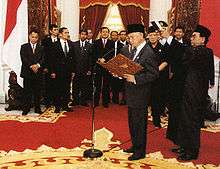
After Suharto's resignation, Vice-President B. J. Habibie was sworn in as president and undertook numerous political reforms.
In February 1999, the Habibie administration passed the Political Parties Law,[6] under which political parties would not be limited to just three as had been the case under Suharto. Political parties were also not required to have Pancasila as their ideology. This resulted in the emergence of many political parties, and 48 would go on to compete in the 1999 legislative election.
In May 1999, the Habibie administration passed the Regional Autonomy Law,[7] which was the first step in decentralising Indonesia's government and allowing provinces to have more part in governing their areas. The press became liberated under Habibie, although the Ministry of Information continued to exist. Political prisoners such as Sri Bintang Pamungkas, Muchtar Pakpahan, and Xanana Gusmão were also released under Habibie's orders.
Habibie also presided over the 1999 legislative elections, the first free election since 1955. It was supervised by the independent General Elections Commission (KPU) instead of an elections commission filled with government ministers as had been the case during the New Order.
In a move that surprised many, and angered some, Habibie called for a referendum on the future of East Timor. Subsequently, on 30 August, the inhabitants of East Timor voted for independence. This territorial loss harmed Habibie's popularity and political alliances.
Wahid presidency (1999–2001)
In 1999, Abdurrahman Wahid became President of Indonesia. His first cabinet, dubbed the National Unity Cabinet (Indonesian: Kabinet Persatuan Nasional), was a coalition cabinet that consisted of members of various political parties. Indonesian Democratic Party of Struggle (PDI-P), National Awakening Party (PKB), Golkar, the United Development Party (PPP), National Mandate Party (PAN), and Justice Party (PK). Non-partisans and the military (TNI) were also represented in the cabinet. Wahid made two administrative reforms. The first was to abolish the Ministry of Information, the New Order's primary weapon in controlling the media while the second was to disband the Ministry of Welfare which had become corrupt and extortionist under the New Order.[8]
Autonomy and tolerance toward dissent
Wahid's plan in Aceh was to give it a referendum. However, this referendum would be to decide on various modes of autonomy rather than to decide on independence like in East Timor.[9] Wahid also wanted to adopt a softer stance towards Aceh by having less military personnel on the ground. In March, the Wahid administration began to open negotiations with the Free Aceh Movement (GAM). Two months later in May, the government signed a memorandum of understanding with GAM to last until the beginning of 2001, by which time both signatories would have breached the agreement.[10]
On 30 December, Wahid visited Jayapura, the capital of Papua province (then known as "Irian Jaya"). Wahid was successful in convincing West Papuan leaders that he was a force for change and even encouraged the use of the name Papua.[11]
In September 2000, Wahid declared martial law in Maluku. By now, it was evident that Laskar Jihad, a radical Islamic militia, were being assisted by members of the military and it was apparent that they were financed by Fuad Bawazier, the last Minister of Finance to have served under Suharto. During the same month, West Papuans raised their Morning Star flag. Wahid's response was to allow this provided that the Morning Star flag was placed lower than the Indonesian flag,[12] for which he was severely criticised by Megawati and Akbar. On 24 December 2000, a series of bombings were directed against churches in Jakarta and eight cities across Indonesia.
In March of that year, Wahid suggested that the 1966 Provisional People's Consultative Assembly (MPRS) resolution on the banning of Marxism–Leninism be lifted.[13]
Relations with the military
When he ascended to the presidency, one of Wahid's goals was to reform the military and to remove its dominant socio-political role. In this venture, Wahid found an ally in Agus Wirahadikusumah, whom he made Commander of Kostrad in March. In July, Agus began uncovering a scandal involving Dharma Putra, a foundation with affiliations to Kostrad. Through Megawati, military members began pressuring Wahid to remove Agus. Wahid gave in to the pressure but then planned to have Agus appointed as the Army Chief of Staff to which top military leaders responded by threatening to retire and Wahid once again bowed down to pressure.[14]
Wahid's relations with the military deteriorated even further when in the same month it was revealed that Laskar Jihad had arrived in Maluku and was being armed with what turned out to be military weapons, despite Wahid's orders to the military to block their entry into the region. The militia had planned earlier in the year to go to the archipelago and assist the Muslims there in their communal conflict with the Christians.[15]
Wahid embroiled in two scandals in 2000 which would damage his presidency. In May, the State Logistics Agency (BULOG) reported that US$4 million was missing from its cash reserve. The missing cash was then attributed to Wahid's own masseur who had claimed that Wahid sent him to Bulog to collect the cash.[16] Although the money was returned, Wahid's opponents took the chance of accusing him of being involved in the scandal and of being aware of what his masseur was up to. At the same time, Wahid was also accused of keeping US$2 million, which was a donation by the Sultan of Brunei to provide assistance in Aceh, for himself, with Wahid failing to account for the money.
Impeachment
By the end of 2000, many within the political elite were disillusioned with Wahid. The most prominent was Amien Rais who showed regret at supporting Wahid to the presidency the previous year. Amien also attempted to rally opposition by encouraging Megawati and Akbar to flex their political muscles. Megawati surprisingly defended Wahid while Akbar preferred to wait for the 2004 legislative elections. At the end of November, 151 DPR members signed a petition calling for the impeachment of Wahid.[17]
In January 2001, Wahid announced that Chinese New Year was to become an optional holiday.[18] Wahid followed this up in February by lifting the ban on the display of Chinese characters and the importing of Chinese publications. In February, Wahid visited Northern Africa as well as Saudi Arabia to undertake the hajj pilgrimage.[19] Wahid made his last overseas visit in June 2001 when he visited Australia.
In a meeting with university rectors on 27 January 2001, Wahid commented on the possibility of Indonesia descending into anarchy. Wahid suggested that he may be forced to dissolve the DPR if that happened.[20] Although the meeting was off-the-record, it caused quite a stir and added to the fuel of the movement against him. On 1 February, the DPR met to issue a memorandum against Wahid. Two memorandums constitute an MPR Special Session where the impeachment and removal of a president would be legal. The vote was overwhelmingly for the memorandum, and PKB members could only walk out in protest. The memorandum caused widespread protests by NU members. In East Java, NU members attacked Golkar's regional offices. In Jakarta, Wahid's opposition began accusing him of encouraging the protests. Wahid denied it and went to talk to the protesters at the town of Pasuruan, encouraging them to get off the streets.[21] Nevertheless, NU protesters continued to show their support for Wahid and in April, announced that they were ready to defend and die for the president.
In March, Wahid tried to counter the opposition by moving against dissidents within his own cabinet. Minister of Justice Yusril Ihza Mahendra was removed for making public his demands for the president's resignation while the Minister of Forestry Nurmahmudi Ismail was also removed under the suspicion of channelling his department's funds to Wahid's opposition. In response to this, Megawati began to distance herself and did not show up for the inauguration of the Ministers' replacement. On 30 April, the DPR issued a second memorandum and on the next day called for an MPR Special Session to be held on 1 August.
By July, Wahid grew desperate and ordered Susilo Bambang Yudhoyono (SBY), the Coordinating Minister for Politics and Security to declare a state of emergency. SBY refused, and Wahid removed him from his position. Finally, on 20 July, Amien declared that the MPR Special Session would be brought forward to 23 July. The TNI, having had a bad relationship with Wahid through his tenure as president, stationed 40,000 troops in Jakarta and placed tanks with their turrets pointing at the Presidential Palace in a show of force.[22] To prevent the MPR Special Session from taking place, Wahid then enacted a Decree disbanding the MPR on 23 July despite had no power to do so. In defiance against Wahid's decree, the MPR proceed with the Special Session and then unanimously voted to impeach Wahid, and to replace him with Megawati as president. Wahid continued to insist that he was the president and stayed for some days in the Presidential Palace but bowed down and left the residence on 25 July to immediately fly to the United States for health treatment.
Megawati presidency (2001–2004)
Under Megawati Sukarnoputri, the daughter of Indonesia's founder and first president Sukarno, the process of democratic reform begun under Habibie and Wahid continued, albeit slowly and erratically. Megawati appeared to see her role mainly as a symbol of national unity, and she rarely actively intervened in government business. Under her tenure, the Mutual Assistance Cabinet (Indonesian: Kabinet Gotong Royong) helped govern the country. It included Megawati's successor, the retired General SBY. The military, disgraced at the time of Suharto's fall, regained much of its influence. Corruption continued to be pervasive, though Megawati herself was seldom blamed for this.
Some Indonesian scholars explained Megawati's apparent passivity in office by reference to Javanese mythology. Megawati, they said, saw her father, Sukarno, as a "Good King" of Javanese legend. Suharto was the "Bad Prince" who had usurped the Good King's throne. Megawati was the Avenging Daughter who overthrew the Bad Prince and regained the Good King's throne. Once this had been achieved, they said, Megawati was content to reign as the Good Queen and leave the business of government to others. Some prominent critics such as Benedict Anderson jokingly referred to the president as "Miniwati."[23]
Although the economy had stabilised and partly recovered from the 1997 crisis by 2004, unemployment and poverty remained high. The Indonesian Constitution was amended to provide for the direct election of the president, and Megawati stood for a second term. She consistently trailed in the opinion polls, due in part to the preference for male candidates among Muslim voters, and due to what was widely seen as a mediocre performance in office. Despite a somewhat better than expected performance in the first round of the elections, she was defeated by SBY in the second round.
Yudhoyono presidency (2004–2014)
Two months after SBY assumed office, the 2004 Indian Ocean earthquake and tsunami struck Aceh and other countries along the Indian Ocean coastline. Three months later, an aftershock of the earthquake triggered a tsunami in Nias Island. In 2006, Mount Merapi erupted and was followed by an earthquake in Yogyakarta.
Indonesia also suffered a small outbreak of bird flu and endured the Sidoarjo mud flow. In 2007, severe floods struck Jakarta. SBY allowed Jakarta governor Sutiyoso to open the Manggarai watergate with the risk of flooding the Presidential Palace.[24]
On 1 October 2005, suicide bombings occurred on the island of Bali. The attacks bore the hallmarks of the militant Islamic group Jemaah Islamiyah (JI)—a group linked to Al-Qaeda—though police investigation was underway. The group was also responsible for the 2002 Bali bombings. SBY condemned the attack, promising to "hunt down the perpetrators and bring them to justice.".[25]
In 2005, economic growth was 5.6%[26] which decreased to 5.4% in 2006[27] Inflation reached 17.11% in 2005[28] but decreased to 6.6% in 2006.[29]
SBY also allocated more funds to decrease poverty. In 2004, 11 trillion rupiah was set aside, increasing to 23 in 2005 and 42 in 2006. For 2007, 51 trillion was allocated.[30] In March and October 2005, SBY made the unpopular decision to cut fuel subsidies, leading to increases in fuel prices of 29% and 125% respectively.[31] The poor were somewhat compensated by the Direct Cash Assistance (BLT), but the cutting of subsidies damaged SBY's popularity. In May 2008, rising oil prices contributed to SBY's decision to cut fuel subsidies once more, which were the subject of protests in May and June 2008.
In 2009, SBY was elected for a second term along with Boediono, the former Governor of Bank Indonesia. They defeated two candidates: Megawati Soekarnoputri - Prabowo Subianto and incumbent vice-president, Jusuf Kalla - Wiranto. The SBY-Boediono ticket won the election with more than 60% votes of nationwide in the first round.
Jokowi presidency (since 2014)
In 2014, constitutionally barred from running for a third term, SBY was succeeded by Joko Widodo (Jokowi) with Kalla returning as vice president, defeating Prabowo and Hatta Rajasa. Jokowi is the first president without a high-ranking military or political background. During his 2014 election campaign, Jokowi promised to improve economic GDP growth to 7% and to end the bagi-bagi kursi (giving government positions to political allies) policy, although these promises are yet to be fulfilled. The Indonesian rupiah hit its lowest level record in 20 years during his administration.[32][33]
A controversial remark by his former deputy governor Basuki Tjahaja Purnama (Ahok) led to divisions in the country's Muslim population amid a gubernatorial election. The Jokowi administration responded by banning the Indonesian chapter of Hizb ut-Tahrir.
There have been concerns of declining freedom of expression during this period, evidenced by the arrest, detainment, and imprisonment of many people for their social media activity being interpreted as an "insult" to the president.[34]
Several disasters, such as earthquakes (In Palu, Lombok, and Banten) and a haze due to deforestation in Borneo and Sumatra occurred during this period. ISIL-linked bombings have also occurred in Jakarta and Surabaya.
Central Statistics Agency reported in March 2018 that the poverty rate in Indonesia was 9.82 percent, down from March 2017 which was 10.64 percent. This was the first time that poverty levels in Indonesia had been reduced to below two digits. Previously, the poverty rate was always above 10 percent, even reaching 23.4 percent in 1999 after the 1997-1998 crisis.[35]
Notes
- US Indonesia Diplomatic and Political Cooperation Handbook, Int'l Business Publications, 2007, ISBN 1433053306, page CRS-5
- Robin Bush, Nahdlatul Ulama and the Struggle for Power Within Islam and Politics in Indonesia, Institute of Southeast Asian Studies, 2009, ISBN 9812308768, page 111
- Armed Conflicts Report.Indonesia - Kalimantan
- Dayak
- THE RELATIONSHIP BETWEEN DAYAK AND MADURA IN RETOK by Yohanes Supriyadi Archived 24 March 2012 at the Wayback Machine
- "Undang-Undang RI No 2 Tahun 1999 Tentang Partai Politik". detik.com. Archived from the original on 23 March 2006. Retrieved 30 October 2006.
- "Undang-Undang RI No 22 Tahun 1999 Tentang Pemerintahan Daerah". tumotou.net. Archived from the original on 4 July 2006. Retrieved 31 October 2006.
- Barton (2002), p. 290.
- Miller, Michelle. Rebellion and Reform in Indonesia. Jakarta's Security and Autonomy Policies in Aceh (London: Routledge, 2008), pp.66-68. ISBN 978-0-415-45467-4
- Conceicao, J.F (2005). Indonesia's Six Years of Living Dangerously. Singapore: Horizon Books. pp. 30–31. ISBN 981-05-2307-6.
- Barton, pages 293
- Barton (2002), page 340
- ryi/wis/sal (14 April 2000). "Dari Secangkir Kopi ke Hawa Nafsu". Kompas. Archived from the original on 18 August 2006. Retrieved 30 December 2006.
- Conceicao, J.F (2005). Indonesia's Six Years of Living Dangerously. Singapore: Horizon Books. p. 21. ISBN 981-05-2307-6.
- Barton (2002), page 306
- Barton (2002), page 304
- Barton (2002), page 345
- Chang, Yau Hoon (April 2004). "How to be Chinese". Inside Indonesia. Archived from the original on 28 March 2007. Retrieved 31 December 2006.
- Barton (2002), page 352
- Barton (2002), page 348
- Barton (2002), pages 351-352
- Barton (2002), page 363
- Mydans, Seth (24 July 2001), "Woman in the News; A Daughter of Destiny; Megawati Sukarnoputri", The New York Times
- Pemerintah Kabupaten Situbondo - PRESIDEN PERSILAHKAN GUBERNUR BUKA PINTU AIR MANGGARAI Archived 11 June 2008 at the Wayback Machine
- "Bali bombs 'were suicide attacks'". BBC News. 2 October 2005. Retrieved 22 May 2010.
- [ekonomi-nasional] [Kilas Berita] Pertumbuhan Ekonomi 2005 5,6 Persen
- Seputar Ekonomi
- http://www.antara.co.id/seenws/?id=25514
- "Inflasi Indonesia Menurut Kelompok Komoditi, 2006, 2007, Jan-Mei 2008 (2002=100), Juni - Desember 2008 (2007=100), 2009, 2010, 2011 (2007=100)". Badan Pusat Statistik. Archived from the original on 9 February 2011.
- :: elshinta.com - berita utama :: Archived 19 June 2008 at the Wayback Machine
- Redaksi Tempo (24–30 October 2005). SBY-JK Duet Atau Duel: Edisi Khusus Setahun Pemerintahan SBY-JK. Jakarta, Indonesia. p. 90.
- "Indonesia rupiah falls to weakest level in more than 20 years". CNBC. Retrieved 9 October 2019.
- "Rupiah Terabas Level Rp 15248 Anjlok Terendah Sejak Krismon 1998". Okezone. Retrieved 9 October 2019.
- "Street Vendor Arrested Insulting Jokowi Megawati".
- "Cuitan Bikin Onar, Mustofa Nahra Berujung Status Tersangka".
- "Hina Presiden di Facebook, Pelajar SMK Divonis 15 Tahun Penjara".
- "Jadi Tersangka Kasus Dugaan Hina Jokowi Bareskrim Polri Tidak Tahan Bahar Bin Smith".
- "Jerry D Gray Resmi Ditahan Polisi Karena Hina Jokowi".
- "Kerap Cela Presiden dan Unggah Meme Kapolri Dengan DN Aidit, Haidar Asal Pasuruan Diringkus Polisi".
- "Dokter Yang Hina Panglima TNI Dan Jokowi Ditahan Bareskrim".
- "Ustaz Alfian Tanjung Harus Jalani Hukuman 2 Tahun Penjara Kasus Hina Jokowi Dan Ahok".
- "Caleg Gerindra Yang Tuding Jokowi PKI Ditahan Di Polda Jateng".
- "Turunkan Foto Jokowi Saat Demo Mahasiswa Sumbar Ditangkap".
- Suyanto, Bagong (1 August 2018). "Angka Kemiskinan Satu Digit". Kompas.id (in Indonesian). Retrieved 20 November 2019.
References
- Barton, Greg (2002). Abdurrahman Wahid: Muslim Democrat, Indonesian President. Singapore: UNSW Press, p. 320. ISBN 0-86840-405-5, pages 290
Further reading
- Chandra, Siddharth and Douglas Kammen. (2002). "Generating Reforms and Reforming Generations: Military Politics in Indonesia’s Transition to Democracy." World Politics, Vol. 55, No. 1.
- Dijk, Kees van. (2001). A country in despair. Indonesia between 1997 and 2000. KITLV Press, Leiden, ISBN 90-6718-160-9
- Kammen, Douglas and Siddharth Chandra. (1999). A Tour of Duty: Changing Patterns of Military Politics in Indonesia in the 1990s. Ithaca, NY: Cornell Modern Indonesia Project No. 75.
- Bünte, Marco/Andreas Ufen: Democratization in Post-Suharto Indonesia, London: Routledge
